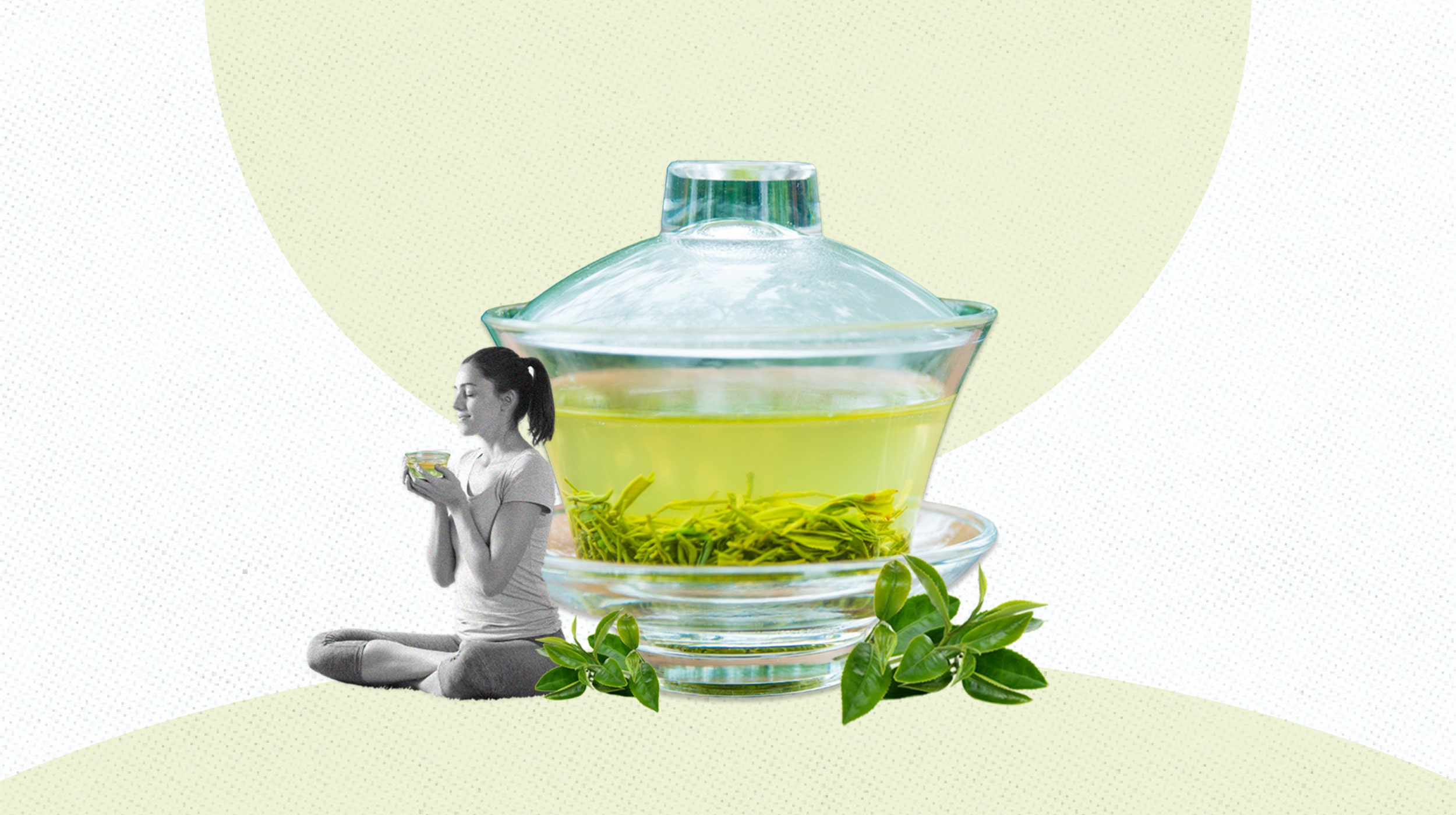It’s said that aside from water, tea is the most consumed drink in the world. However, not all teas carry as many health benefits as green tea. Green tea is originally grown in China, and comes from Camellia sinensis leaves which have not been oxidized[1] – green tea goes through the least amount of processing compared with other teas. Its leaves are used to make black and oolong teas and the minimal processing means it has higher concentrations of nutrients, including antioxidants and polyphenols, which promote optimal health in numerous ways. Let’s find out 8 green tea benefits in this article!
8 Health Benefits Of Green Tea You Should Know
- Improves brain function
- Contains polyphenols and antioxidants
- A better alternative to coffee
- May help with weight loss
- Can lower the risk of cancer
- Great for the heart
- Can prevent bad breath
- Improves skin health
Green Tea Benefits: What Are They?
Improves Brain Function
The caffeine in green tea (though not as much as coffee) serves as a stimulant that can help boost brain function. Caffeine helps induce neuron firing and the amount of dopamine and norepinephrine, which then improves mood, response time, and memory. However, there are other components of green tea that aid in better brain health, including the amino acid L-theanine, which can cross the blood-brain barrier. L-theanine increases neurotransmitters such as GABA, which helps to ease anxiety.
Contains Polyphenols And Antioxidants
Polyphenols are essential compounds found in some plant foods, including fruits, vegetables, some grains, tea, coffee, and wine – you’ll notice these are all deeply colorful foods (the rich colors in these foods are from different polyphenols). They are what make health-promoting chemicals in foods and they come packed with antioxidants that have disease-fighting powers – though polyphenols and antioxidants go hand-in-hand, they are different (polyphenols contain antioxidants). Here are some examples:
- Antioxidants in dark chocolate: flavonol
- Antioxidants in red wine: resveratrol
- Antioxidants in red wine: resveratrol
Better Alternative To Coffee

Caffeine has many health benefits, and for those who tolerate it well, can be a welcomed addition to a healthy diet. However, many people don’t respond well to caffeine and need a lesser amount of potency. This is where green tea shines. There is 3-4 times the amount of caffeine in coffee as there is in green tea. Many people who switch from coffee to green tea feel increased energy and alertness without the wiry buzz, or jittery feeling, that often comes with coffee.
May Help With Weight Loss
Many dietary supplements contain green tea extracts, due to green tea’s ability to increase fat burning and metabolism. The studied effects of green tea on weight loss still vary from individual to individual, however, the findings are promising.[2] It’s thought that in addition to polyphenols, the catechins, and caffeine in green tea work together to increase weight loss. Of course, drinking green tea alone is not advised for weight loss, as weight loss is a complex bodily process that requires attention to diet, exercise, sleep, and hormone balance.
Can Lower Risk Of Cancer
Studies have shown some correlation between higher green tea consumption and lower cancer rates,[2] though a direct cause-and-effect link has not been established yet.
Consuming green tea can also help ward off cancer due to its high antioxidant profile. Antioxidants help to fight oxidative stress in the body which causes cell damage – that cell damage could potentially develop into diseases, like cancer. Scientists have discovered links between green tea consumption and lowered risk of cancers of the breast, colon, and prostate. In some cases, using green tea topically may serve as a natural sunscreen, protecting the skin against harmful UVB radiation which could lead to skin cancer.
Great For The Heart
Green tea extract may lower the risk[2] of developing heart disease, but this is especially so for avid tea drinkers (one cup a week may not make a dent). The evidence indicates that drinking multiple cups of brewed green tea a day is advised to have this effect. Researchers discovered a 25% reduction in heart disease in those who consumed green tea regularly. It also helped them reduce their chances of dying from heart disease or stroke.
Can Prevent Bad Breath
Green tea leaves contain catechins, which have been shown in lab tests to have positive effects on oral health. The catechins do this by reducing bacterial overgrowth in the mouth, and with the reduction of bacteria comes less risk of infection, tooth decay, and bad breath. It’s not proven yet whether these anti-bacterial effects can be had from drinking the tea or if they come from the isolated catechins, however, there’s enough evidence to suggest that it may be worth incorporating into your oral hygiene routine.
Improves Skin Health
Green tea is made from unfermented tea leaves which have a stronger concentration of antioxidants. Antioxidants fight free radicals, not only inside the body but on the skin, helping to repair damaged skin cells and encourage new skin cells to grow. The antibacterial properties in green tea make it ideal to apply topically if you suffer from acne – it can reduce acne as well as swelling and inflammation. Using green tea on the skin can also protect it, serving as a natural sunscreen.
Green Tea 101: Nutrition Information
While green tea is high in polyphenols and antioxidants,[2] it has about one-third or one-fourth the amount of caffeine as coffee (each cup varies slightly). While high in health-promoting compounds, green tea has no sugar, fiber, carbs, protein, calories, sodium, or fat. This makes it ideal to consume throughout the day for hydration and antioxidant boosts.
Calcium, iron, and potassium can also be found in small amounts in a cup of green tea (there are larger amounts in the tea itself, but once steeped, some of the nutrients are depleted). These amounts are not enough to make a significant difference for those who need more of these vitamins in their diet and are therefore not an adequate replacement for foods or supplements that contain calcium, iron, or potassium.
The Best Time To Have Green Tea

As with most teas, green tea can be enjoyed throughout the day, whenever it is convenient for you. However, green tea does contain caffeine and for many people, ingesting caffeine in the afternoon or evening can disrupt their sleep at night, so it may be best to have your green tea in the morning to ensure your sleep is not affected.
Supplements With Green Tea Ingredients
Because green tea has many health benefits, it is sold as a solo supplement as well as included in other supplement mixtures. Those looking to improve cognition, lose weight, or prevent disease may find themselves searching for green tea in the supplement aisle. When looking for a green tea supplement or tea bags, seek out quality in reputable brands, such as:
- Life Extension
- Now
- Thorne
- Gaia
- Vitanica
- Pure Encapsulations
- Klaire Labs
- DaVinci Labs
- Vital Nutrients
Special Notes To Use Green Tea Effectively
Green tea is relatively safe, however, it is a caffeinated beverage, so take caution when ingesting if you are sensitive to caffeine.
Also, green tea has many medicinal properties, however, it may be less effective if not consumed in adequate amounts. To see results for certain conditions, it may mean drinking at least two cups of green tea every day.
Conclusion
Tea is almost as popular as water when it comes to how people get in their hydration, which is why it’s so important to choose a high-quality tea such as green tea. Originally grown in China and other parts of Asia, green tea is minimally processed compared to other teas and comes packed with high concentrations of antioxidants, which help fight and prevent disease and preserve health. Green tea can be ingested in traditional tea form but is also dried into powder and put into capsule form. These supplements are used to enhance health, lose weight, and even improve skin.
Frequently Asked Questions
Both green tea and coffee have polyphenols and caffeine, however, green tea has less caffeine than coffee. They each have health benefits, but one may be better suited to certain individuals. The only way to know is to see how you feel about each.
For more acute conditions and to actively prevent disease, drinking a few cups of green tea daily is ideal. However, those in good health may enjoy it less often.
This will depend on what your need for green tea is – a qualified health practitioner can recommend the best way to take green tea and the dosage for your unique health needs.
 Expert's opinion
Expert's opinion
